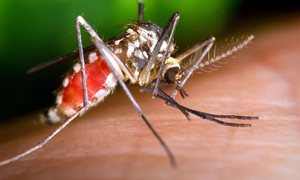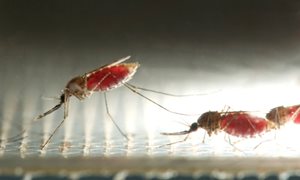
The vaccine for shingles, a condition that can cause itching, pain, and blisters, has a 90% effect, even in people over seventy. This is remarkable, because most vaccines work less well in the elderly. The Radboudumc is investigating why this vaccine works so well and how knowledge about it can contribute to the effectiveness of other vaccines.
The condition shingles is caused by an infection with the varicella-zoster virus, also the causative agent of chickenpox. After experiencing chickenpox, the virus remains in the body without being active. If the virus becomes active again later in life, shingles occurs, which often begins with pain and itching, followed by blisters on the body. The infectious disease particularly affects the elderly and those in poor health.
There is an effective vaccine against shingles: the Shingrix vaccine. It has an effectiveness of 90%. This means that, for example, people over the age of 70 who are vaccinated with Shingrix have 90% less shingles than those over 70 who are not vaccinated.
And that's interesting, according to researchers at the Radboudumc. Because most vaccines work less well in older people, because their immune system ages. So which element in the shingles vaccine makes it such an effective vaccine? "If we know that, we can use that knowledge to increase the effectiveness of other vaccines, such as the flu or corona vaccine," explains Executive Researcher Gizem Kilic. She is therefore starting a study, in collaboration with Radboudumc professor and principal investigator Mihai Netea, on the immune system's response to the shingles vaccine compared to the flu vaccine.
The researchers suspect that they should look for the cause in a particular substance of the shingles vaccine. Kilic: "This substance, also called an adjuvant, strengthens the effect of the vaccine. This adjuvant, which is called AS01, seems to additionally activate the immune system."
The mechanism of the immune system
And then two options follow, Kilic explains. To understand those options, we need to zoom in a little deeper on the immune system. Our immune system consists of two parts; the innate and the acquired immune systems. The innate immune system is the first line of defense against infections and other pathogens: it springs into action quickly and is not very selective in clearing out invaders. The acquired immune system comes into action a little later, after about ten days, and specifically targets certain pathogens.
It was long thought that only the acquired part can learn to recognize the pathogens it comes into contact with, making a new attack milder. It was also thought that the innate part cannot. But in recent years, it has become clear that the innate immune system does have a memory and can therefore be 'trained'. Training means that a vaccination, such as the shingles vaccine, can prepare the immune system for, and arm it against not only that specific disease, but also against other infectious diseases.
"So one explanation for the high effectiveness is that the shingles vaccine activates both innate and acquired defenses because of that specific substance. The other possibility is that a broader acquired immune response is triggered by this vaccine," Kilic said. By mapping out which paths the shingles vaccine takes in the immune system, she hopes to shed more light on the exact reason why this vaccine works well.
Increased effectiveness of other vaccines
This knowledge is relevant for two reasons, according to Kilic: "First, in a provisionally published, i.e. not yet peer-reviewed, American study, we see that people with the shingles vaccine have a lower risk of COVID infection as well as hospitalization due to COVID-19. We want to know how this is possible. Is the immune system extra activated by that adjuvant in the vaccine, so that it also better fights other infections? And in addition, we want to know which part of the immune system then plays a role." In time, this knowledge can contribute to the improvement of other vaccines, increasing the effectiveness of these as well.
Participation in the study
In this study, the researchers are comparing the shingles vaccine and flu vaccine, in a group of young people and a group of older people. Elderly people, over sixty, can still sign up for the study. Look here for more information and the conditions for participation.
-
Want to know more about these subjects? Click on the buttons below for more news.
More information
Pauline Dekhuijzen

wetenschaps- en persvoorlichter
Related news items

Grants for research on magnesium deficiency and malaria Vidis for Felix Hol and Jeroen de Baaij
1 July 2022 Radboudumc researchers Jeroen de Baaij and Felix Hol both receive an NWO Vidi grant for their research, respectively on magnesium deficiency in type 2 diabetes and on malaria. go to page
Field research on malaria vaccine offers unexpected surprise
23 May 2022Field research on the effectiveness of a malaria vaccine, came up with unexpected results for an international group of researchers including Benjamin Mordmüller of Radboudumc. The vaccine evokes a broader response against malaria proteins than there are in the vaccine.
go to page
Rubicon grants awarded to three RIMLS researchers
19 April 2022Three researchers have received Rubicon funding from NWO/ZonMw. This will enable Elke Muntjewerff, Laura de Vries and Laurens van de Wiel to do research at a foreign research institute for the next two years.
go to page


